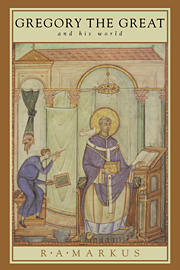Book contents
- Frontmatter
- Contents
- Preface
- List of abbreviations
- Maps
- 1 Introduction: a contemplative in a troubled world
- 2 Integritas animi: ministry in the Church
- 3 Sapienter indoctus: scriptural understanding
- 4 Appropinquante mundi termino: the world in its old age
- 5 The Christian community and its neighbours
- 6 Christiana respublica: within the confines of the Empire
- 7 Terra mea: Italy between two worlds
- 8 Argus luminosissimus: the pope as landlord
- 9 Scissum corpus: the schism of the Three Chapters
- 10 Ravenna and Rome: and beyond
- 11 In cunctis mundipartibus: the far West
- 12 Inconcussam servare provinciam: dissent in Africa
- Epilogue
- Appendix On the distribution of Gregory's correspondence
- Glossary of terms for offices
- Sources
- Secondary works referred to
- Index of Gregorian texts
- General index
11 - In cunctis mundipartibus: the far West
Published online by Cambridge University Press: 05 June 2012
- Frontmatter
- Contents
- Preface
- List of abbreviations
- Maps
- 1 Introduction: a contemplative in a troubled world
- 2 Integritas animi: ministry in the Church
- 3 Sapienter indoctus: scriptural understanding
- 4 Appropinquante mundi termino: the world in its old age
- 5 The Christian community and its neighbours
- 6 Christiana respublica: within the confines of the Empire
- 7 Terra mea: Italy between two worlds
- 8 Argus luminosissimus: the pope as landlord
- 9 Scissum corpus: the schism of the Three Chapters
- 10 Ravenna and Rome: and beyond
- 11 In cunctis mundipartibus: the far West
- 12 Inconcussam servare provinciam: dissent in Africa
- Epilogue
- Appendix On the distribution of Gregory's correspondence
- Glossary of terms for offices
- Sources
- Secondary works referred to
- Index of Gregorian texts
- General index
Summary
We have now considered Gregory's pontificate within the sphere of the Empire and of the imperial Church, and on its borders, where it overlapped with barbarian Europe, in Lombard-occupied Italy (chapters 6–10). We have already seen something of Gregory's work in the context of a Germanic people, the Lombards. Their settlement, however, was of recent origin, and had developed far less towards a consolidated kingdom (or more than one) than had the kingdoms of the Franks in Gaul and that of the Visigoths in Spain. The English kingdoms, at a more fluid stage of their development, were also older than that of the Lombards. The Germanic kingdoms entered the orbit of Gregory's cura in different ways; but whatever the nature of the pastoral care that he saw himself called to exercise in each, he saw them all within a perspective determined by his Roman and imperial heritage.
An index of this is the diplomatic language he adopted in his dealings with the Germanic rulers of Western Europe and the emperors respectively. The traditional modes of addressing the emperor were redolent of deference, even veneration, towards him. The normal practice of the papal writing office echoed imperial protocol. In contrast, barbarian rulers were addressed by titles corresponding to those assigned to topranking imperial officials, as ‘glorious’ or ‘most excellent’. Gregory often calls them – if they were Catholic Christians – his ‘sons’ or ‘daughters’: something he never did with emperors, always his ‘lords’ (though he did refer to the emperor as ‘his son’, albeit only writing to third parties).
- Type
- Chapter
- Information
- Gregory the Great and his World , pp. 163 - 187Publisher: Cambridge University PressPrint publication year: 1997



